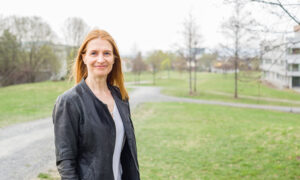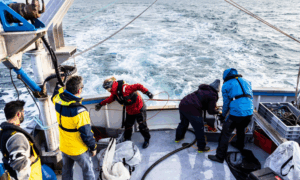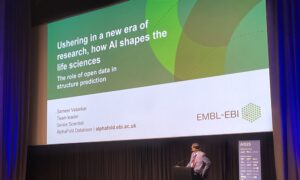
EMBL Lautenschläger summer school celebrates fifth birthday
Supported by funding from the Manfred Lautenschläger-Stiftung, the summer school introduces undergraduates from a range of scientific backgrounds to cutting-edge life science research

The fifth edition of the EMBL Lautenschläger summer school recently came to a close, marking a new milestone for the programme. The two-week summer school allows undergraduate students from various non-biology disciplines to experience the exciting world of interdisciplinary life science research.
The course was first held in 2019 with 20 students from 18 countries, including 13 EMBL member states. After a short hiatus during the pandemic, the school returned in 2022, convening every year since then. It’s made possible thanks to substantial funding from the Manfred Lautenschläger-Stiftung and further generous donations.
The primary goal of the Lautenschläger summer school, aptly titled ‘Visualising life’, is to encourage students from other scientific fields to get excited about biology and to understand that they can make valuable contributions with the expertise and insights from their respective backgrounds.
This year, participants included undergraduate students studying mathematics, chemistry, biotechnology, computer science, and engineering, among other disciplines. Over two weeks packed with lectures, discussions, and practical exercises, they learned about cutting-edge microscopy techniques, their applications in answering fascinating biological questions, the foundational principles that enable these techniques, and new methods for data analysis and interpretation.
“The quality of the course was exceptional while still being accessible to those with a non-biology background, and we covered so many different parts of interdisciplinary biology,” said Mishaela Andrews, one of the participants of the course and a student at the University of Oxford, UK. “We got to meet so many scientists in different parts of their careers and from different academic backgrounds. I now feel like I have a much better understanding of what a career in mathematical biology would look like and am definitely more inclined to take my career in that direction.”
The students also built a microscope from scratch, using it for imaging biological samples. In addition, they worked on presentations, which they delivered to the group at the end of the course. Informal networking sessions and coffee breaks across the duration of the workshop provided an opportunity for participants to get to know each other, as well as to interact with the instructors and organisers outside of a classroom setting.
“The opportunity to meet students from so many different countries, academic backgrounds, and stages in their education was such a rare and wonderful experience,” said Chiara Welsch, a course participant and a student at the University of Edinburgh, UK. “The way the summer school was structured made it easy to form genuine connections and friendships.”
The summer school provided an opportunity for many to think more deeply about how their own fields of study may intersect with life sciences. “For me, the summer school offered a completely new perspective on how technology can be directly connected to biology,” said Tainá Bonfim, a student at Insper, Brazil, and a course participant. “I had never considered how to apply my knowledge in this field, but since joining the program, I can’t think of anything else. It was a privilege to spend this time at EMBL and to meet such inspiring people.”
The 2025 course was marked by a visit by Catharina Seegelken, Managing Director of the Manfred Lautenschläger Foundation, who took part in a small celebration to mark the fifth anniversary.
Over the years, the Lautenschläger course has trained 98 participants from 38 countries. For some, it has even acted as a launch pad for pursuing interdisciplinary career paths rooted in the life sciences, like Eric Laudemann, who attended the course in 2022 and joined EMBL Heidelberg’s Petridou Group in 2025 as a predoctoral fellow.
“Attending the Lautenschläger Summer School was a pivotal moment for my career – the first time that I, coming from computer science, had the opportunity to experience biological research for myself, and talk to biologists working on the leading edge of the field,” Laudemann said. “The breadth of the talks opened up a fascinating world of discovery, which was entirely new to me. I was especially impressed by the openness and collaborative spirit I encountered at EMBL – people from all over the world coming together to investigate the mysteries of life.”
And this experience had a happy consequence. “I spent two wonderful weeks at the school, and came home with a new goal – to return to EMBL for a PhD, and work on a project of my own in this amazing environment. Three years later, I am happy to report that this dream has come true,” said Laudemann.
“From hands-on sessions to insightful lectures, the Summer School created a rich environment of learning and exchange,” said Monique Borges Seixas, a student at Universidade Tecnológica Federal do Paraná, Brazil, and participant in the 2025 edition of the summer school. “What I’ll carry with me forever are the knowledge gained, the friendships built, and the renewed certainty that I want to be part of the future of science.”


